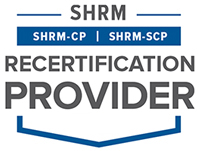+1-800-385-1627
support@hrtrainonline.com
0 items
Can We Talk? How to Bring Up Touchy Topics without Triggering Defensiveness
June 25, 2025
10:00 AM PDT | 01:00 PM EDT
90 Minutes
37695

Group Attendees: Any number of participants
Recorded Version: Unlimited viewing for 6 months ( Access information will be emailed 24 hours after the completion of live webinar)

The use of this seal confirms that this activity has met HR Certification Institutes (HRCI) criteria for recertification credit pre-approval.
This activity has been approved for
1.5 HR
(General) recertification credit
 HRTrainOnline is recognized by SHRM to offer Professional Development Credits (PDCs) for the SHRM-CP® or SHRM-SCP®.
?
HRTrainOnline is recognized by SHRM to offer Professional Development Credits (PDCs) for the SHRM-CP® or SHRM-SCP®.
?
1-hour and 15 minute concurrent conference session = 1.25 PDCs.
3-hour e-learning course = 3 PDCs.
Having "crucial conversations" about difficult issues is one of the most challenging-and avoided-aspects of work life.
Think about the many situations in your career where you avoided having a potentially difficult conversation because you didn’t believe it would go well. Think about the emotional toll that followed because the issue wasn’t resolved and tension remained between you and the other person.Whether it’s deciding about bringing up an issue with one’s supervisor about ways they’re supervising that aren’t helpful, or whether to give someone who tends to get defensive constructive feedback, or considering the potential ramifications of voicing one’s frustrations with another department, we all know what it’s like to avoid having important conversations because of our discomfort and our belief that we’ll simply make things worse.
By increasing our skill at facilitating constructive conversations, we increase our confidence that these challenging conversations will go well, and are therefore more willing to have them, rather than avoid them.
The chances that an emotionally loaded conversation will go well is directly related to, first, how we prepare for the conversation, and second, the words we choose to open the conversation.
Get these wrong and we will likely trigger the defensiveness and combativeness we feared.
Get these right, and we are likely to elicit open-mindedness and receptivity in the other person.
This program is about how to do latter.
Why you should Attend: This program will help you develop a “virtuous cycle” that increases your ability to facilitate constructive conversations.
More specifically, because you will learn practical skills and guiding principles for bringing up difficult issues in an effective way, you will have more confidence in your ability to have such conversations.
Because you have greater confidence, you will be more likely to have them, rather than avoid them.
Because you’re more likely to have these conversations and have new skills, you have the chance to practice these skills and refine them, which increases your competence.
This increased competence further increases your confidence, you will be less likely to avoid difficult issues, allowing the problem to grow and experiencing the emotional toll of the unresolved problem.
Instead, you are willing and able to have these conversations, talk about what needs to be talked about, resolve it, and move on.
Areas Covered in the Session:
- How to shift out of a hurt, angry, or fearful emotional and mental state, so you can enter important, challenging conversations in a productive state, which profoundly influences how well the conversation will go
- How to use the Declaration/Invitation format to initiate a conversation in a way that fosters an open-minded, non-defensive response
- What words and approaches to avoid, so you don’t automatically trigger defensiveness and combativeness
- Phrases you can “copy and paste” that foster Psychological Safety-i.e. the felt sense that you are someone they can be unguarded and candid with
Who Will Benefit:
- Leaders
- Managers
- Team Leaders
- Department Heads
- Supervisors and anyone in Leadership Role
- Project Managers
- Small Business Owners
 David Lee , the founder of HumanNature@Work, is an internationally recognized thought leader in the field of employee engagement and performance. He is the author of over 150 articles and book chapters that have been published in trade journals and books in the US, Europe, India, Australia, and China, as well as the books Dealing with a Difficult Co-Worker and Powerful Storytelling Techniques (published by ASTD Press).
In addition to his research and work with both struggling and “best in class” organizations, David Lee’s work draws from a wide range of scientific disciplines including cognitive neuroscience, anthropology, psychoneuroimmunology, trauma and resilience research, and paleopsychology.
David Lee , the founder of HumanNature@Work, is an internationally recognized thought leader in the field of employee engagement and performance. He is the author of over 150 articles and book chapters that have been published in trade journals and books in the US, Europe, India, Australia, and China, as well as the books Dealing with a Difficult Co-Worker and Powerful Storytelling Techniques (published by ASTD Press).
In addition to his research and work with both struggling and “best in class” organizations, David Lee’s work draws from a wide range of scientific disciplines including cognitive neuroscience, anthropology, psychoneuroimmunology, trauma and resilience research, and paleopsychology.
Taking this research which typically doesn’t find its way into the business world, David translates these principles of human nature into practical leadership and managerial strategies that optimize employee performance.
To capture the impact understanding human nature makes, David borrows from the popular TV show The Dog Whisperer, and explains “Understanding human nature helps you become a People Whisperer, and by doing so, dramatically improves your ability to get the best results from others (and yourself).”
Recently, his work on what makes organizations resilient and employees perform at their best has focused on the central role productive relationships and productive conversations have on these outcomes, with this being the take away message:
“Every better business result you want requires having a better conversation.”
